|
|
|
Sort Order |
|
|
|
Items / Page
|
|
|
|
|
|
|
| Srl | Item |
| 1 |
ID:
170680
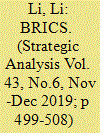

|
|
|
|
|
| Summary/Abstract |
The emergence of BRICS is a reflection of the economic power shift from the north to the south. BRICS cooperation is driven by their shared identity as emerging economies. BRICS will play a bigger role in reshaping the world economic order through reform of the existing international institutions and within the framework of G20. It is in no way aimed at toppling the existing world order or forming an anti-West bloc. The strength of BRICS depends on continued domestic reforms within its member states, its institutionalization, and its cooperation with others both from the south and the north
|
|
|
|
|
|
|
|
|
|
|
|
|
|
|
|
| 2 |
ID:
170685
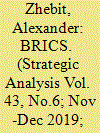

|
|
|
|
|
| Summary/Abstract |
Having overcome its ‘middle-power’ complex during the centre-left governments, Brazil obtained a relatively robust position in international politics as global power, siding with G-20, BRICS and other multilateral bodies. However, since the 2018 presidential elections Brazil has been undergoing a visible shift in its foreign policy towards more alignment with the US and the West that questions its traditional international autonomy, multilateralism, South-South engagement and environmental activism. This shift may consequently affect not only its positioning within the BRICS and governance alike, but also cause a slide into a conservative complacency with a hegemonic vision of the multipolar world.
|
|
|
|
|
|
|
|
|
|
|
|
|
|
|
|
| 3 |
ID:
170677
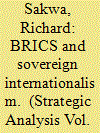

|
|
|
|
|
| Summary/Abstract |
The article outlines four types of globalism contending for hegemony today. The struggle of what effectively represents different types of international order is one reason why international politics today looks so disordered. The BRICS association is firmly located as part of one of these orders, that of sovereign internationalism, but is challenged by the disruptive implications of the Trumpian mercantilist order. BRICS and its members as a result are drawing closer to the liberal internationalist model. However, this is made more difficult by liberalism’s shift towards some of the Trumpian exclusionary agenda. Despite some inner contradictions, the BRICS is one of the institutional and normative cornerstones of sovereign internationalism.
|
|
|
|
|
|
|
|
|
|
|
|
|
|
|
|
| 4 |
ID:
170687
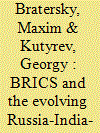

|
|
|
|
|
| Summary/Abstract |
Russia India and China are paying more and more attention to international security issues. They have developed a broad common security agenda via cooperation through two international institutions created by them. BRICS serve as a mechanism for promoting their economic security interests, SCO is focused on traditional security issues. Along with forming a common position on main international security problems, Russia, India and China act as great powers and disagree on certain security matters mostly of regional and bilateral nature. Cooperation prevails in their foreign strategies, but they are unlikely to create a strong military-political alliance
|
|
|
|
|
|
|
|
|
|
|
|
|
|
|
|
| 5 |
ID:
170682


|
|
|
|
|
| Summary/Abstract |
This article examines the preconditions and reasons for interaction between BRICS countries in the fields of science, research and university education. It analyzes the particular ways in which the member countries develop and coordinate their positions in these areas. It also reviews and evaluates the practical experience gained from cooperating on scientific and technological research and innovation (STRI), and the functioning of the BRICS Network University, and considers the prospects for further joint work in these areas.
|
|
|
|
|
|
|
|
|
|
|
|
|
|
|
|
| 6 |
ID:
170681


|
|
|
|
|
| Summary/Abstract |
The picture of the post-crisis world is shaped by the paradigm shifts about the sustainability of national development as a globally integrated co-development and as a necessary condition for national security and defence. Each state faces the steep task of developing new effective foreign economic policy, replacing the former export-oriented and protectionist import-substituting strategies. Such policy changes primarily concern the BRICS countries, including Russia and its place/role in expanding international trade in intermediate goods and services. Simultaneously, Russia and the BRICS must develop new mechanisms of economic cooperation between themselves in the form of global value chains (GVCs).
|
|
|
|
|
|
|
|
|
|
|
|
|
|
|
|
| 7 |
ID:
170678


|
|
|
|
|
| Summary/Abstract |
The BRICS are at a turbulent crossroads as renewed great power competition intersects with countervailing tendencies in the emerging multipolar arena. Their success depends avoiding the external costs and domestic pathologies generated by great power friction. Emerging multipolarity provides opportunities for manoeuvre, but only if outsized China accommodates the other BRICS as it competes against the United States. The BRICS’ strongest common aversion concerns American hegemony and its weaponization of finance. BRICS states are defensively motivated to develop mechanisms to limit infringements on their sovereignty and autonomy. However, in China and Russia financial nationalism is also rising, bolstering Renminbi internationalization
|
|
|
|
|
|
|
|
|
|
|
|
|
|
|
|
| 8 |
ID:
170689
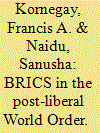

|
|
|
|
|
| Summary/Abstract |
Given complexities currently underpinning multipolar realities of the international system, it seems that a pluralist internationalism is becoming a strategic consideration for a post-Western world order. This warrants new agendas for cooperation. Based on the latter this analysis examines to what extent the BRICS can articulate such a new agenda based on a South African-informed perspective. This involves exploring the basis of a BRICS-African agenda competing with the geo-political interests of sub-groupings such as the SCO, RIC, and the EAEU. There seems ample room for BRICS, and South Africa as a member of BRICS, to make a difference in addressing how a changing African landscape through Agenda 2063 and implementation of the African Continental Free Trade Agreement can advance continental integration and its positioning globally. The onus is on South Africa to ensure that the African agenda in the BRICS finds resonance.
|
|
|
|
|
|
|
|
|
|
|
|
|
|
|
|
| 9 |
ID:
170691


|
|
|
|
|
| Summary/Abstract |
The BRICS group has gone a long way from being the simple acronym to becoming global political player. While it remains undecided whether the BRICS will evolve into a comprehensive, consolidated alliance in global politics, the trend towards increased collaboration and institutionalization now indicates that this may well be feasible. The article examines the relationship between the European Union and BRICS and seeks to understand whether the EU and BRICS are more likely partners or rivals. It analyses the BRICS agenda in comparison to the EU’s interests and focuses on EU–BRICS countries’ bilateral relations. The article concludes that on global issues BRICS and the EU have many controversies while on a state-to-state level they are interested in partnership and cooperation.
|
|
|
|
|
|
|
|
|
|
|
|
|
|
|
|
| 10 |
ID:
170686


|
|
|
|
|
| Summary/Abstract |
This article examines the evolution of Russia’s policy towards BRICS from the time of its formation as a group of four countries in 2006 to the present. The authors analyse the main political objectives that guided Moscow in initiating the creation of this format and in developing it in subsequent years. The article argues that, with Russia as a participant, the character of the organization has undergone major changes, due both to the changing international situation and fundamental changes that the foreign policy of Russia itself has undergone since 2014.
|
|
|
|
|
|
|
|
|
|
|
|
|
|
|
|
| 11 |
ID:
170684
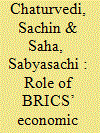

|
|
|
|
|
| Summary/Abstract |
This article attempts to understand BRICS from the perspective of a multi-polar world order and the role played by India at the BRICS. Specifically, the article looks at the implication that BRICS has for future of multilateralism, promoting new institutional delivery mechanisms, upholding the space for development and equity, and highlights India’s contribution to the shaping of the BRICS agenda. The future of BRICS cooperation and scope for deeper collaboration would necessarily evolve out of the priorities of global governance reforms, contribution to global public goods, meaningful economic cooperation, deepening of institution-building efforts and the convergence of the guiding principles.
|
|
|
|
|
|
|
|
|
|
|
|
|
|
|
|
| 12 |
ID:
170679
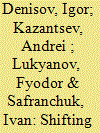

|
|
|
|
|
| Summary/Abstract |
This article builds on extensive debates on the role of BRICS in world order. But instead of focusing on BRICS’ impact on the world order, the article takes a different methodological approach. It traces how much the evolution of BRICS’ rational was prompted by changes of the international system and Russia’s and China’s grand strategies. The key finding is that the BRICS does not determine major world developments, but acclimatizes to the evolving international situation. Particular attention is paid to how the BRICS has adapted to the rise of great power politics and competition in recent years.
|
|
|
|
|
|
|
|
|
|
|
|
|
|
|
|
| 13 |
ID:
170690
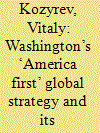

|
|
|
|
|
| Summary/Abstract |
The article explores America’s evolving policy towards BRICS in the context of the Trump administration’s new ‘America First’ global strategy. Even though the BRICS grouping has not become an anti-systemic or anti-liberal force, its attempts to form an alternative centre of global power has prompted the US to manage multipolarity. The Trump administration has continued America’s previous policies of hedging potential BRICS consolidation and enhancing its regional engagement in the era of sovereignty revivalism and deglobalisation. To preserve its group identity, the BRICS needs to secure each country’s coordinated development capabilities and retain the group’s common economic, political, and security agendas.
|
|
|
|
|
|
|
|
|
|
|
|
|
|
|
|
| 14 |
ID:
170683
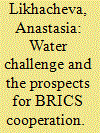

|
|
|
|
|
| Summary/Abstract |
Brazil and Russia rank first and second globally by the amount of renewable freshwater resources. Despite the significant challenges to municipal water use and water quality for the population, even in the timespan of 30 years these countries will be most protected from water stress. At the same time, China and India - countries with vast water resources, meet growing water challenges being the first and second in terms of world population and the world’s first and third economy according to PPP with prospects for further growth. South Africa is the flagship of BRICS on the African continent - the water-deficient country that is mostly affected by the physical shortage of water resources. This article aims to systematize possible areas of deepening cooperation in BRICS through the water agenda. It seems necessary to firstly assess the significance of the water factor for the member-states, than to characterize the current level of dialogue and applied interaction on water issues in BRICS. Secondly, the article compares international approaches to the water problem and, based on this, in the third part, analyzes the possibilities of BRICS to develop cooperation through the water agenda. As a result, the article concludes that, despite the objective physical prerequisites for water dialogue in BRICS as a strategic direction for the development of an organization, the formats that have emerged today clearly consider water cooperation in a rather limited aspect. The article suggests that the perspectives associated with a comprehensive agenda must be built on nexus concepts like water-food-energy-climate-sustainability nexus etc. Virtual water and the exchange of water technologies, and the creation of common water-technology clusters deserve a special place on the agenda as well as specially designed programmes by the BRICS New Development Bank.
|
|
|
|
|
|
|
|
|
|
|
|
|
|
|
|
| 15 |
ID:
170688
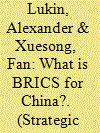

|
|
|
|
|
| Summary/Abstract |
This article studies China’s approach to BRICS. It argues that China sees BRICS as a major asset in its effort to become a major world power and to reform the international system so that it becomes fairer and better serve its interests. However, in China’s view, these interests coincide with the interests of other major non-Western states which also suffer from this sense of unfairness, therefore this position is not self-seeking. This is a major problem which should be overcome with the help of other developing countries. But to change the situation, not a revolution but a gradual evolution based on negotiations and persuasion, is needed. This position makes China not a revisionist but rather a conservative power, within the existing international system.
|
|
|
|
|
|
|
|
|
|
|
|
|
|
|
|
|
|
|
|
|